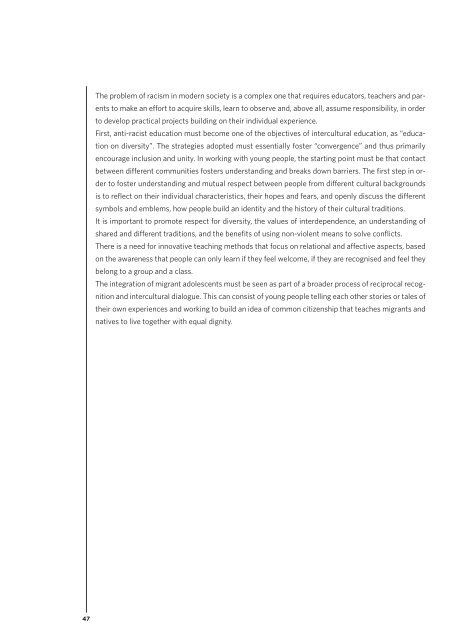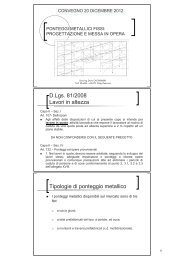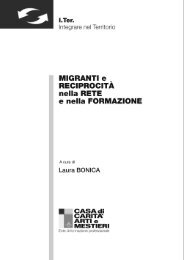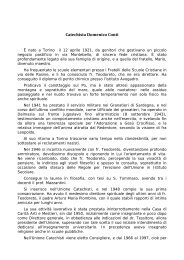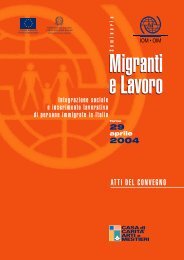Rapporto finale/ Final Report (ITA-ENG) - Casa di Carità Arti e Mestieri
Rapporto finale/ Final Report (ITA-ENG) - Casa di Carità Arti e Mestieri
Rapporto finale/ Final Report (ITA-ENG) - Casa di Carità Arti e Mestieri
Create successful ePaper yourself
Turn your PDF publications into a flip-book with our unique Google optimized e-Paper software.
47<br />
The problem of racism in modern society is a complex one that requires educators, teachers and par-<br />
ents to make an effort to acquire skills, learn to observe and, above all, assume responsibility, in order<br />
to develop practical projects buil<strong>di</strong>ng on their in<strong>di</strong>vidual experience.<br />
First, anti-racist education must become one of the objectives of intercultural education, as “education<br />
on <strong>di</strong>versity”. The strategies adopted must essentially foster “convergence” and thus primarily<br />
encourage inclusion and unity. In working with young people, the starting point must be that contact<br />
between <strong>di</strong>fferent communities fosters understan<strong>di</strong>ng and breaks down barriers. The first step in order<br />
to foster understan<strong>di</strong>ng and mutual respect between people from <strong>di</strong>fferent cultural backgrounds<br />
is to reflect on their in<strong>di</strong>vidual characteristics, their hopes and fears, and openly <strong>di</strong>scuss the <strong>di</strong>fferent<br />
symbols and emblems, how people build an identity and the history of their cultural tra<strong>di</strong>tions.<br />
It is important to promote respect for <strong>di</strong>versity, the values of interdependence, an understan<strong>di</strong>ng of<br />
shared and <strong>di</strong>fferent tra<strong>di</strong>tions, and the benefits of using non-violent means to solve conflicts.<br />
There is a need for innovative teaching methods that focus on relational and affective aspects, based<br />
on the awareness that people can only learn if they feel welcome, if they are recognised and feel they<br />
belong to a group and a class.<br />
The integration of migrant adolescents must be seen as part of a broader process of reciprocal recognition<br />
and intercultural <strong>di</strong>alogue. This can consist of young people telling each other stories or tales of<br />
their own experiences and working to build an idea of common citizenship that teaches migrants and<br />
natives to live together with equal <strong>di</strong>gnity.


